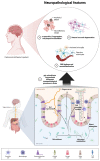Does the Gut Microbial Metabolome Really Matter? The Connection between GUT Metabolome and Neurological Disorders
- PMID: 36235622
- PMCID: PMC9571089
- DOI: 10.3390/nu14193967
Does the Gut Microbial Metabolome Really Matter? The Connection between GUT Metabolome and Neurological Disorders
Abstract
Herein we gathered updated knowledge regarding the alterations of gut microbiota (dysbiosis) and its correlation with human neurodegenerative and brain-related diseases, e.g., Alzheimer's and Parkinson's. This review underlines the importance of gut-derived metabolites and gut metabolic status as the main players in gut-brain crosstalk and their implications on the severity of neural conditions. Scientific evidence indicates that the administration of probiotic bacteria exerts beneficial and protective effects as reduced systemic inflammation, neuroinflammation, and inhibited neurodegeneration. The experimental results performed on animals, but also human clinical trials, show the importance of designing a novel microbiota-based probiotic dietary supplementation with the aim to prevent or ease the symptoms of Alzheimer's and Parkinson's diseases or other forms of dementia or neurodegeneration.
Keywords: Alzheimer’s disease; Parkinson’s disease; gut microbiota; metabolome; microbiome; neurodegeneration; probiotics.
Conflict of interest statement
The authors declare no conflict of interest.
Figures


Similar articles
-
The Gut-Brain Axis in Alzheimer's and Parkinson's Diseases: The Catalytic Role of Mitochondria.J Alzheimers Dis. 2024;100(2):413-429. doi: 10.3233/JAD-240524. J Alzheimers Dis. 2024. PMID: 38875045 Review.
-
Dysbiosis of gut microbiota and microbial metabolites in Parkinson's Disease.Ageing Res Rev. 2018 Aug;45:53-61. doi: 10.1016/j.arr.2018.04.004. Epub 2018 Apr 26. Ageing Res Rev. 2018. PMID: 29705121 Review.
-
Emerging role of gut microbiota in modulation of neuroinflammation and neurodegeneration with emphasis on Alzheimer's disease.Prog Neuropsychopharmacol Biol Psychiatry. 2021 Mar 2;106:110112. doi: 10.1016/j.pnpbp.2020.110112. Epub 2020 Sep 16. Prog Neuropsychopharmacol Biol Psychiatry. 2021. PMID: 32949638 Review.
-
Gut dysbiosis, defective autophagy and altered immune responses in neurodegenerative diseases: Tales of a vicious cycle.Pharmacol Ther. 2022 Mar;231:107988. doi: 10.1016/j.pharmthera.2021.107988. Epub 2021 Sep 16. Pharmacol Ther. 2022. PMID: 34536490 Review.
-
Dysbiosis and Alzheimer's disease: role of probiotics, prebiotics and synbiotics.Naunyn Schmiedebergs Arch Pharmacol. 2023 Nov;396(11):2911-2923. doi: 10.1007/s00210-023-02554-x. Epub 2023 Jun 7. Naunyn Schmiedebergs Arch Pharmacol. 2023. PMID: 37284896 Review.
Cited by
-
Clinical Evidence on the Potential Beneficial Effects of Probiotics and Prebiotics in Cardiovascular Disease.Int J Mol Sci. 2022 Dec 14;23(24):15898. doi: 10.3390/ijms232415898. Int J Mol Sci. 2022. PMID: 36555535 Free PMC article. Review.
-
Milmed Yeast Alters the LPS-Induced M1 Microglia Cells to Form M2 Anti-Inflammatory Phenotype.Biomedicines. 2022 Dec 2;10(12):3116. doi: 10.3390/biomedicines10123116. Biomedicines. 2022. PMID: 36551872 Free PMC article.
-
The Alterations of Gut Microbiome and Lipid Metabolism in Patients with Spinal Muscular Atrophy.Neurol Ther. 2023 Jun;12(3):961-976. doi: 10.1007/s40120-023-00477-6. Epub 2023 Apr 27. Neurol Ther. 2023. PMID: 37103747 Free PMC article.
-
Microbiome Dysbiosis Shows Strong Association of Gut-Derived Altered Metabolomic Profile in Gulf War Chronic Multisymptom Illness Symptom Persistence Following Western Diet Feeding and Development of Obesity.Int J Mol Sci. 2023 Feb 20;24(4):4245. doi: 10.3390/ijms24044245. Int J Mol Sci. 2023. PMID: 36835663 Free PMC article.
-
Probiotics for Neurodegenerative Diseases: A Systemic Review.Microorganisms. 2023 Apr 20;11(4):1083. doi: 10.3390/microorganisms11041083. Microorganisms. 2023. PMID: 37110506 Free PMC article. Review.
References
Publication types
MeSH terms
Grants and funding
LinkOut - more resources
Full Text Sources
Medical

